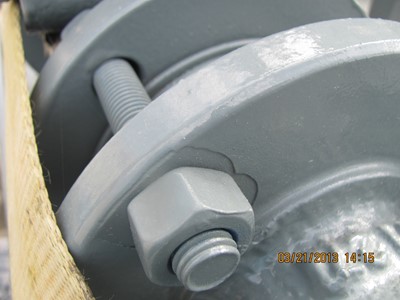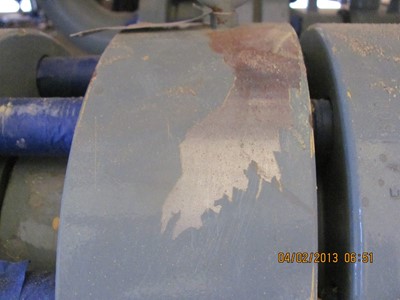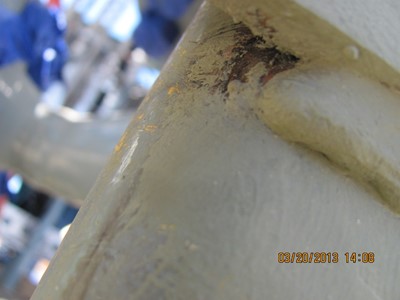Why you need a qualified coating inspector
May 14, 2021 •Corrosion CONTROLLED, Corrosion Essentials, M&I

Consultant and certified inspector Ken Judice, Jr. talks of the importance and money-saving benefits of using qualified and experienced surface preparation and coating inspection personnel.
Assigning unqualified inspectors - an all-too-common practice
There are many experienced coating inspectors and paint representatives who can relate to the statement, “The newly painted equipment that just arrived needs significant paint repairs.” This is most common outside the construction site on packages supplied by “others.” There are numerous and complicated reasons for the previous statement.
Recently, I received a phone call from a severely agitated, experienced, and well-known paint representative in the industry. The conversation began something like this: “How does your client expect us to provide a marine warranty for paint on this equipment when nobody at the client level watched the surface preparation and application? Have you seen the pictures?” My response was, “The client assigned a mechanical inspector to watch the surface preparation and painting, and I am the one who sent you the pictures.”
I had begged the client early in the project to hire qualified, experienced, and certified coating inspectors, but I received the typical response from the project manager: “It’s just paint and anybody can inspect paint.” Again, I insisted on qualified, experienced, and certified paint inspectors. His second and final response was, “Our mechanical inspector has been around paint before and we don’t have the money in the budget to hire an additional inspector.” My final response: “I hope there is plenty of money budgeted and time allotted in the schedule to repair the paint system upon arrival at the installation yard or offshore structure because the cost of a certified and experienced paint inspector is pennies compared to what one has to pay for the repairs.”
An all-too-common coating inspection case study
This may sound absurd, but many of have experienced the same scenario dozens of times with tremendous disgust at the wasted money and effort. On a recent project, I was asked to travel and meet the mechanical inspector on location to look at the finished paint job. We found:
• visible poorly feathered edges
• trash embedded within the coating
• dry spray
• visible runs and sags
• the wrong color
• the wrong paint system
• uncured coatings
• no stripe coat applied
• partial kits were mixed or product was mixed incorrectly and in dirty containers with the wrong solvent
• rust was visible through the coating, and
• there were no available paint reports.
The list goes on to include excessive film build, holidays, mechanical damage, and much more.
This particular piece of equipment was scheduled for delivery in two days. The scenario was further complicated since the mechanical inspector called the inspection coordinator and project manager and proceeded to communicate how picky the paint inspector was since the equipment didn’t need an “automobile finish.” The project manager came down, the paint inspector walked him through all the issues, and he realized that the paint inspector was “spot on” with regards to the findings. However, the equipment had to be delivered and there was no time to repair it before it left. Next, the mechanical inspector stated that he was not a paint inspector and that someone should have requested the paint inspector sooner.
The equipment was shipped to the installation yard on time since there was no more time in the schedule to correct the paint at the vendor yard. The owner spent three times the amount of money to repair the job than it cost to paint it in the first place.
What a coating inspector brings to the job
Many mechanical inspectors have been around painting for years and many paint inspectors have been near welding and electrical work for years, but I have never experienced paint inspectors watching over welding or electrical work. Volts, amps, travel speed, welding consumables, position, root spacing, welding process, and joint preparation are crucial considerations for sound weldments. Likewise, dew point, relative humidity, surface temperature, air temperature, depth of profile, abrasive type, degree of cleanliness, degree of blast, applicator technique, pot pressure, fan width, and air pressure are equally important considerations for a paint job.
A coating inspector with formal coating training and certification knows how to properly take surface profile readings, calibrate dry film thickness (DFT) gauges, use DFT gauges, use wet film thickness gauges, discern the difference between degrees of abrasive blasting, and be familiar with standards such as SSPC-VIS 1,1 VIS 2,2 and PA 2.3. Additionally, the inspector must know what proper feathering looks like, know when the air pressure is too high, know when the pot pressure is too high, know when to use low-voltage holiday detection as opposed to high-voltage holiday detection, know the differences in airless spray vs. conventional spray, etc. Formal training, certification, and experience are required to inspect paint properly.
Industry needs to change the way budgets are established for inspections and realize the importance of using qualified, experienced, and certified coating inspectors. Welding and painting are very different crafts that require differing levels of expertise. Metals and equipment are only as good as the coating protecting them. Metal never stops trying to return to its original state as an ore, and this process is accelerated under many conditions.
The cost of corrosion in the United States in 2013 exceeded $1 trillion (6% of the GDP) so why do we continue to make poor decisions in the way we budget and inspect coatings?
On most large construction sites, adequate inspectors are provided for their respective crafts. At off-site vendor locations, however, the inspection coverage may be marginal at best and rarely does one find inspectors for their respective crafts. Usually the mechanical inspector watches all of it. On most large projects, the equipment packages equal the cost of the structure at the construction site. In short, there is a lot of painting and it becomes costly when the paint job is not performed according to the requirements of the client or paint manufacturer, leading to failure.
Paint warranties from the paint manufacturer come with most large projects but they do not include the application. I have heard management say many times, “It does not matter, we have a warranty from the paint manufacturer and someone else will bear the cost if it fails.” It is quite a surprise when a letter comes later describing how the cost of the repairs will not be covered since the paint manufacturer’s requirements for surface preparation and application were not followed. Again, most paint warranties cover the paint materials only. It is in the best interest of the client to ensure that the manufacturer’s recommendations for surface preparation and application are followed through the use of experienced, qualified, and certified coating inspectors. If the recommendations of the paint manufacturer for surface preparation and application are not followed and properly documented, it will be very hard, if not impossible, to prove the problem to be with the paint material.
Inspection today - less than the cost of rework tomorrow
It can be very frustrating for a coating inspector to arrive on a location after the coating work has been completed and have to inform the project manager that the work is not satisfactory and must be repaired. It is equally frustrating to mechanical inspectors to be informed that this happened on their watch. Likewise, it can cause problems with the contractor since the company had an inspector present watching the work, qualified or not. Experienced, qualified, and certified welding inspectors know fabrication and experienced, qualified, and certified coating inspectors know paint. Stick with the experts in their respective fields and more times than not, the result will be quality work.
It is up to the project manager to recognize the expertise needed and the potential problems that may occur without using qualified personnel. Finally, don’t blame the paint manufacturer; the manufacturer supplies the paint and is there to provide technical support as requested. One cannot expect the product to perform if no one ensures proper surface preparation and application through proper inspection coverage. The cost of inspection today is much cheaper than the cost of rework tomorrow.
Figure 1 (above)-4: Common coating failures.
Figure 2: This poorly feathered three-coat system following coating repairs from bolt tightening will lead to lifting, creep, and rusty flanges.
Figure 3: Poorly prepared surface for brushed zinc primer with visible holiday.
Figure 4: No anchor profile was provided on this valve body, causing the coating system to detach from the polished substrate.
Are you looking for a certified coating inspector for your project? Do you need to validate your employees' certification? Use the NACE Institute's Credential Registry.
Source: Originally appeared online at materialsperformance.com authored by Ken Judice, Jr.; images from SSPC-VIS 1, “Guide and Reference Photographs for Steel Surfaces Prepared by Dry Abrasive Blast Cleaning."
FREE DOWNLOADS
White Paper: An Action Plan for Reducing Pipeline Failures, Costs with Corrosion in the Water Sector
Special Report: The Future of Corrosion Control, Insights from the Experts
Get Updates
Featured Articles
Categories
- 2024 Olympics (1)
- 2024 Water Resource Development Act (1)
- Abrasive Blasting (1)
- Advanced coating materials (9)
- advanced coatings (1)
- Advanced Corrosion Control in Oil and Gas Industry (2)
- Advocacy (3)
- AI (2)
- Aircraft (1)
- Alkanization (1)
- AMPP (4)
- AMPP Annual Conference + Expo (5)
- ampp awards (1)
- ampp certification (2)
- Ampp Chapters (1)
- AMPP conference (1)
- AMPP logo (1)
- Ampp Membership (2)
- Ampp Standards (3)
- ampp training (2)
- Amusement parks (4)
- Architectural (1)
- Architectural Coatings (2)
- argonne national laboratory (1)
- Artificial Intelligence (1)
- Asset integrity (12)
- Asset maintenance (3)
- Asset Protection (1)
- awards (3)
- B2B Marketing (1)
- Bim Software (1)
- Biodeterioration of materials (5)
- Biofouling (4)
- Blasting (1)
- Bridges (4)
- career advancement (3)
- career development (2)
- cathodic protection (2)
- Cathodic Protection-CP (16)
- Ceramic epoxies (1)
- Certification (3)
- certification study guide (1)
- Chemical Injection (1)
- CIP (1)
- Civil Engineering (1)
- clean energy (1)
- Coating inspector (2)
- coating inspector job roles (1)
- Coating inspector jobs (2)
- Coating inspector program (2)
- Coatings (18)
- Coatings Application (3)
- coatings certification (1)
- Coatings failures (2)
- Coatings Industry (2)
- coatings inspection (1)
- Coatings inspector (2)
- Coatings measurement and inspection (9)
- coatings project management (1)
- Coatings Systems (1)
- Cold stress (1)
- Concrete (13)
- Concrete corrosion (1)
- concrete cracking (1)
- Conference and Events (2)
- Corrosion (26)
- Corrosion Basics (5)
- corrosion certification (1)
- Corrosion Control (17)
- Corrosion Control and Management (23)
- Corrosion detection (1)
- corrosion engineering (1)
- Corrosion Essentials (20)
- Corrosion Inspection (1)
- Corrosion Management (1)
- Corrosion Meaning (1)
- corrosion mitigation (1)
- corrosion of steel (1)
- corrosion policy (1)
- Corrosion Prevention (13)
- corrosion resistance (1)
- corrosion resources (1)
- Corrosion Under Insulation (2)
- cost of corrosion (1)
- Crevice Corrosion (1)
- Cui (2)
- Data Monitoring (1)
- decarbonization (1)
- defense infrastructure (1)
- Department of Defense (4)
- Deposition corrosion (1)
- Dissimilar Metal Corrosion (1)
- Dissolved gases (1)
- DoD (3)
- Education (2)
- EMERG (1)
- Energy industry (9)
- entertainment industry (1)
- Epoxy (3)
- exam preparation (1)
- FBE Application (1)
- FBE Inspection (1)
- Fireproofing (1)
- Flexible coatings (2)
- Flint, Michigan (1)
- Fluoropolymer coating (3)
- Forms of Corrosion (4)
- Freshwater salinization (1)
- Fusion-bonded epoxy (1)
- Galvanic (1)
- Galvanic Corrosion (4)
- General Corrosion (4)
- General Tips (1)
- Global supply chain resilience (1)
- glossary (1)
- Hand tools (1)
- honoree night (1)
- Industrial Application (3)
- Industrial Safety (3)
- Industry Best Practices (1)
- Industry Standards (2)
- Infrared Thermography (1)
- infrastructure (4)
- Infrastructure Durability (1)
- Inspection (1)
- integrity management (1)
- Intergranular Corrosion (1)
- International Maritime Organization (IMO) (1)
- Intumescent Coatings (1)
- key note speaker (1)
- leader (1)
- Machine Learning (2)
- Maintenance (2)
- Maintenance Best Practices (1)
- Maritime Coatings (11)
- Maritime industry (12)
- Maritime infrastructure (1)
- Master Painters Institute (2)
- material protection (1)
- materials performance (1)
- materials science (1)
- Membership (2)
- Membership Benefits (2)
- Michio Kaku (1)
- Microbiological forms (1)
- Microbiologically influenced corrosion-MIC (11)
- Military (2)
- Mineral constituents (1)
- MnDOT (1)
- MPI (3)
- mpi awards (1)
- mpi champion awards (1)
- mpi training (1)
- MPI Update (1)
- MR21506-2025 (1)
- National Defense Authorization Act (1)
- national security (1)
- Naval readiness (1)
- Navy (1)
- nickel-based alloys (1)
- Non-Destructive Testing (1)
- nuclear (1)
- nuclear Materials (1)
- nuclear reactor technology (1)
- Oil and Gas (2)
- Oil Fields (1)
- Organic matter (1)
- Oxgen (1)
- Paint and Protective coatings (32)
- Paint specification (1)
- pcs certification (1)
- Personal Protective Equipment (3)
- Petrochemical Plant Fireproofing Methods (1)
- Petrochemical Plants (1)
- Pipeline (2)
- Pitting Corrosion (2)
- Pitting Detection (1)
- Polymer-Based Coatings (1)
- Power plant (1)
- Power tools (1)
- PPE (3)
- Print Advertising (1)
- Print Marketing Strategy (1)
- professional certification (2)
- professional development (1)
- Protecting oceans (1)
- Protective Coatings (7)
- protective coatings industry (1)
- protective coatings specialist (1)
- quality assurance (1)
- radiation-resistant materials (1)
- Real-Time Corrosion Monitoring in Oil Fields (1)
- Rebar Corrosion (2)
- rectifier (1)
- Reliability (1)
- Remote monitoring and drones (4)
- Repaint (1)
- Restoration (1)
- ride maintenance (1)
- Risk-Based Inspection (1)
- Road deicers (1)
- Roads and bridges (1)
- Roller coaster (1)
- Rust (1)
- sacrificial anodes (1)
- Safety (5)
- Safety Standards (3)
- Salt pollution (1)
- Sensors (1)
- service awards (2)
- Ship Coatings (9)
- Shiptanks (1)
- Solvent-free coatings (1)
- Standards (10)
- Standards Committees (2)
- Steel (8)
- Steel Reinforcement (2)
- Stress Corrosion Cracking (1)
- Structural Steel (1)
- study tips (1)
- Surface Preparation (13)
- Sustainability (2)
- Sustainability and corrosion (7)
- terminology (1)
- Tools (1)
- Turbine (1)
- Types of Corrosion (1)
- Ultrasonic Testing (1)
- Uniform Corrosion (1)
- us army core of engineers (1)
- Wastewater Systems (1)
- Water crisis (1)
- Water pipe corrosion (1)
- Water quality (1)
- Water tank coatings (5)
- Water/treatment infrastructure (20)
- Waterway salinity (1)
- What Is Corrosion (1)
- Workforce development (1)
- WRDA (1)



